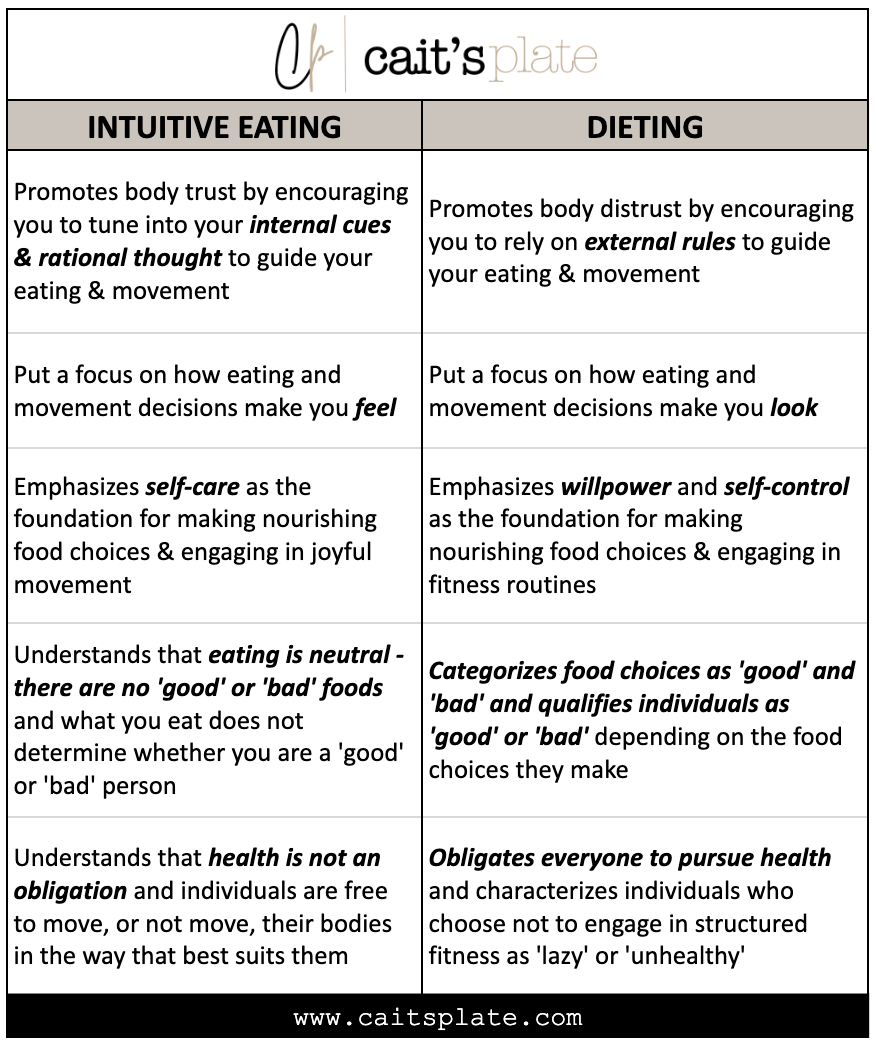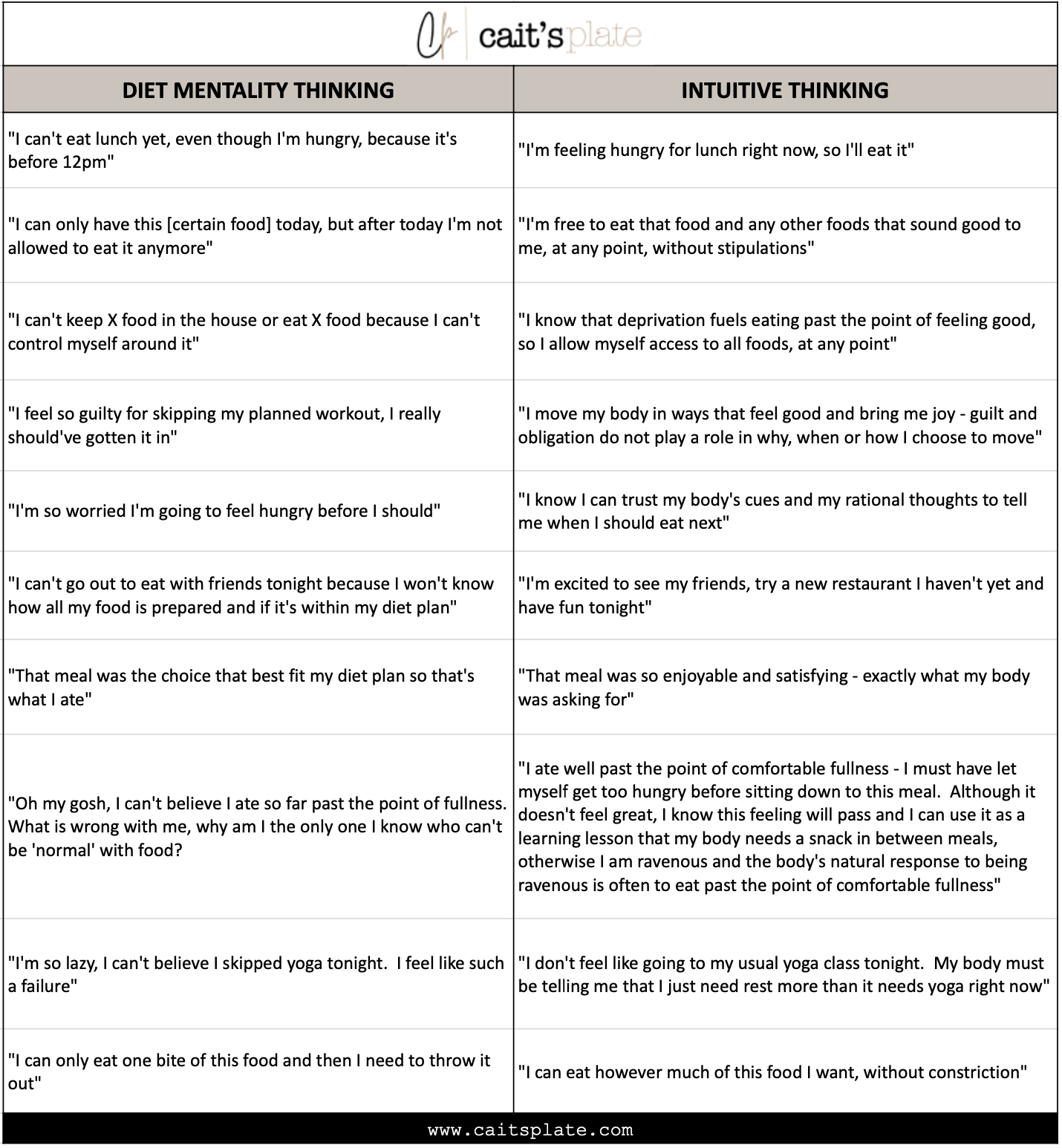One of the most important parts of leaving diet culture and making peace with food & body is breaking free from the diet mindset. This starts with learning to distinguish between the thoughts you have that are actually intuitive versus those that derive from years of dieting.
This is so critical because once you can begin to make that distinction, you’re then able to work to reject and re-frame those disordered thoughts, helping free yourself from the diet cycle.
This, however, also happens to be one of the trickiest things to do, for many reasons. Two of the biggest are:
- We’re born into diet culture, which means we’re exposed to its toxic messaging from birth, making them deeply ingrained. Often we don’t even realize, let alone question, some of our most disordered thoughts around food & body because they’ve been emphasized and re-emphasized so much during our lives, that they seem as ordinary as facts like ‘the sky is blue’ or ‘the grass is green.’
- The other being that, it didn’t take long for diet culture to realize people were catching on to the fact that diets don’t work long-term for the majority. As a result, they’ve started co-opting intuitive eating language to use as part of their ‘it’s not a diet, it’s a lifestyle’ diet plans in order to seem more benign (spoiler alert: they’re still diets and they’re still harmful). This sneakiness on diet culture’s part creates a lot of confusion around what’s considered dieting versus true intuitive eating (just as they’d hoped).
So, this post is all about helping you see through both diet culture’s deceit as well as dig into your more deeply ingrained diet culture beliefs.
I always like to start this off by clearly defining what the diet mentality is as well as what diet culture is. Having a good understanding of both can help you better suss out thoughts and messaging that are truly intuitive versus what might be stemming from diet culture’s influence.
What is the diet mentality? The diet mentality are all those internalized thoughts and beliefs about food, body, weight and movement taught to us by diet culture.
Every time we chastise ourselves for eating something we ‘shouldn’t have’ or deem ourselves lazy or a failure for skipping a workout. Every time we feel we don’t deserve something because our weight, body shape or size is not what we think it ‘should’ be. Every time we judge ourselves and others based on the way they look, move or eat. Every time we miss out on a social gathering, special occasion or a trip because going will make it harder to stick to our diet or fitness goals. That‘s the diet mentality. All the many ways that diet culture concepts manifest in our minds.
________
Take a moment to consider why you started dieting, how dieting impacted your physical and mental well-being and what, if anything, you’ve missed out on as a result of dieting.
________
What is diet culture? When I refer to “diet culture” what I mean is the system of beliefs that:
- Promotes weight loss, the way you eat and move your body as the single path to health, high societal standing and happiness / success / acceptance, neglecting the many other critical factors of health and well-being.
- Has created and continues to hold up “thinness” as the ideal while belittling, demeaning, oppressing and causing significant harm to any body that doesn’t fit its unrealistic standard.
- Equates the way you eat, move or how you look with virtuousness (i.e. you’re ‘good’ if you eat, move and look a certain way and ‘bad’ if you break from that).
- Believes certain patterns of eating or certain foods are ‘right’ and others are ‘wrong,’ creating a society constantly confused about, obsessed with and anxious over what they should and shouldn’t eat at any moment.
- Pulls people away from their passion & purpose in life as they work endlessly to pursue unrealistic body, food & movement ideals.
- Normalizes disordered thoughts, patterns & behaviors (such as: constant obsession with and monitoring of weight, food & exercise, promoting compensatory behaviors, attaching our worth and value as humans to what we’ve eaten, how we move our bodies and the way we look) and makes us feel wrong or irresponsible if we refuse to participate in them.
While every professional may define diet culture in slightly different ways, the common theme is always: a system of beliefs upholding thinness as the ideal, judging food & bodies as ‘right’ and ‘wrong’ and causing a substantial amount of harm on both an individual and societal level.
________
So now that you have a better understanding, take a minute to reflect on the different messages you’ve been given throughout your life (from friends, family members, therapists, doctors, media, etc.) that you feel promote the diet mentality and/or uphold diet culture beliefs.
________
Here’s a quick chart I like to offer that can be used as a gut check when you’re unsure if what’s being promoted or what you’re thinking is intuitive or stemming from diet culture beliefs:

The above chart is by no means exhaustive, but includes some of the most easily confused principles (often made more so by diet culture’s co-opting). I’ve found it can be a helpful reference when more murky thoughts pop up. For example, if you think “I know I need to go for this run even though I’m exhausted because running means I’m taking care of myself” you can take a step back and say “Well actually, if I feel exhausted, that must mean my body is asking for rest, so self-care in this moment would be resting, not forcing myself to go for a previously planned run.”
If you read that example and thought “Wow, I never would’ve arrived at that reframe,” – don’t worry. Breaking free from all of diet culture’s toxic belief systems that are instilled in us from early on takes time, patience and a lot of unlearning. Reframing diet mentality thoughts won’t come easily or naturally at first, but little by little, over time and with continued practice, it will.
Simply understanding where diet culture has influenced your mindset and behaviors is an important first step. With that under your belt, you’ll better be able to recognize when it crops up and can work towards the next important step: combating diet mentality thoughts with anti-diet thoughts.
________
Consider again those messages you thought about earlier. What are ways in which you might reject or re-frame them into more intuitive, anti-diet thoughts?
________
Below are some examples:

Above all, be kind to yourself and put self-compassion at the forefront as you move through this journey. Know that change is hard. It takes time, effort and the ability to treat yourself with empathy along the way. There will be trip ups and slip ups and that is okay, because that means you’re putting in the work. You’re moving toward a life without diet culture, a life where you can make peace with food and your body ♥️.
0
Leave a Reply